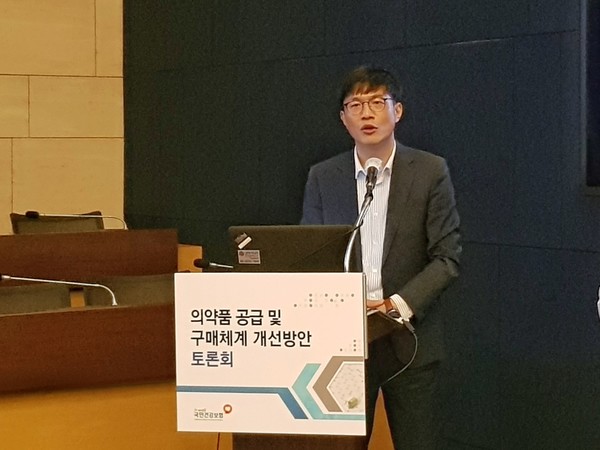“Our policy should aim at reaching the OECD average of general drug use, additionally cut generic drug prices, and expand the use of those drugs.”
Professor Lee Sang-won at Sungkyunkwan University School of Pharmacy remarked so during a debate on improving the drug supply and purchasing system. Lee led the research, “Improvement of Drug Supply and Purchasing System,” commissioned by the National Health Insurance Service (NHIS) last year. He shared the results of the study and proposed policies for drugs in all stages.
“The domestic drug supply issue is intertwined with the supply of generic drugs, distribution of medicines, and supply of locally developed new drugs. Solving only one issue will not tackle the current problem,” Lee said. “This study aimed to discuss the order and the strength of policies and on what to solve first.”

In Korea, the use of generic medicines should be vitalized, but a price or quality competition rarely occurs. “The competition in the distribution process is so heated that some companies offer illegal rebates,” Lee added.
According to Lee’s research, generic drugs in countries with high use of generic medicines among OECD accounted for over 70 percent of the total medication. In Korea, however, generic copies took up only 61.8 percent of the total. In terms of drug cost, generics accounted for only 47.7 percent.
Lee maintained that to expand the use of generic drugs, the government should artificially lower their prices.
An increase in the number of drugs containing the same ingredient leads to a lower price in advanced countries. Still, Korea is far from such a scenario, he said. Reflecting this, Korea should set a target price and lower the overall price of generic drugs.
In Korea, the overall price of generic copies is 53.55 percent of the price tag of the original product. Lee said the price of generic drugs should go down further, based on the period from the drug registration of the first generic copy and the number of medicines containing the same ingredient.
At the same time, the government needs to support drug companies not to allow repercussions from a price cut to affect their business and hurt their R&D investment negatively, he added.
A price reduction of generic drugs should go along with reinforcing regulations to enhance product quality, Lee went on to say.
“When comparing Korea with developed countries, there are no significant differences in drug approval stages. But in terms of approval condition changes after approval and post-management, the regulation is weaker in Korea than in developed countries, and the quality control capacity is insufficient,” he said.
To resolve these issues, he called for enhancing bioequivalence test review and preliminary review on safety tests. For post-marketing management of generic drugs, Korea also needs GMP inspection as rigorous as those in advanced countries.
In a panelist debate, other experts criticized Lee’s view. In particular, the pharmaceutical industry opposed the need for a further price cut of generic drugs.
Kim Jun-su, executive director of the policy committee of the Korean Research-based Pharmaceutical Industry Association (KRPIA), said a policy should have a minimum conflict among stakeholders and promote the industry’s overall competitiveness to be feasible. “Rather than cutting the prices of generic drugs and expanding their use, we need the policy to support technology innovation related to new drug development,” he said.
Jang Woo-soon, head of the external relations at the Korea Pharmaceutical and Bio-Pharma Manufacturers Association (KPBMA), said the price of generic drugs has been going down for the past 20 years.
“There is no good policy or discussion for the expansion of generic drug use,” he said. “Lowering the generic drug prices will pull down the overall industry's capacity and slow new drug development.”
Another expert cautioned the increase of generic drug use in industrial and economic perspectives.
Min Yang-ki, director of medical affairs at the Korean Medical Association, said people need to think what the purposes of improving the drug supply and purchasing system are.
“It is another story how expanded use of generic drugs will affect the quality of healthcare services,” he noted.

